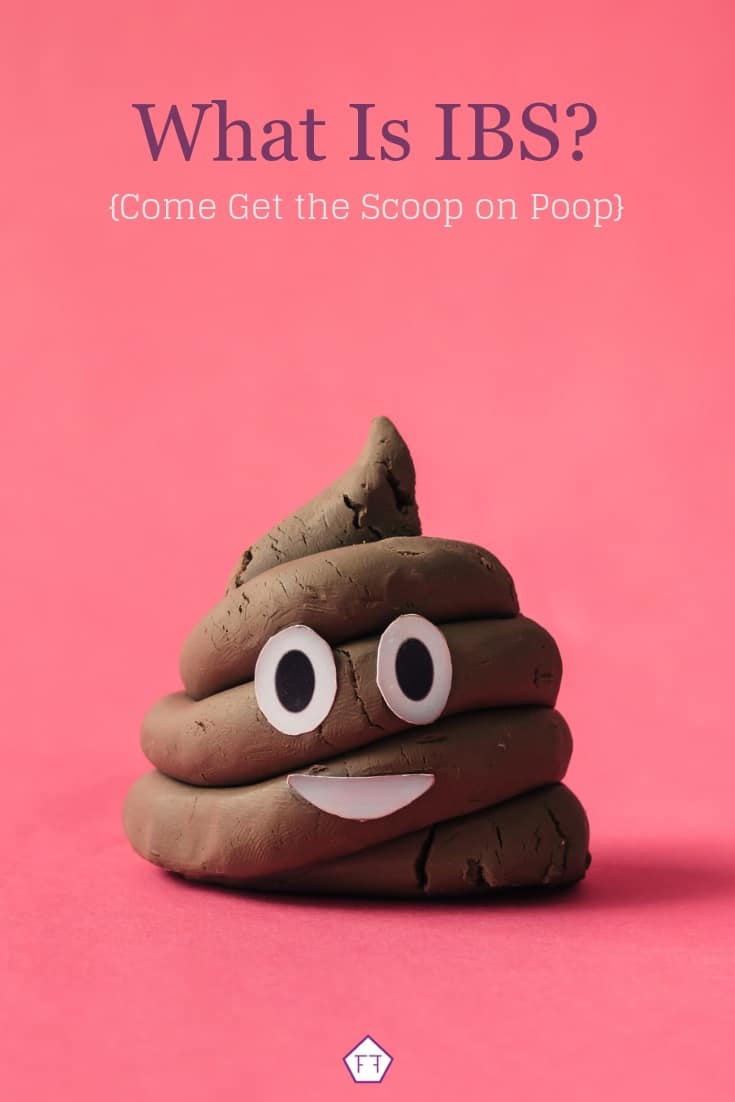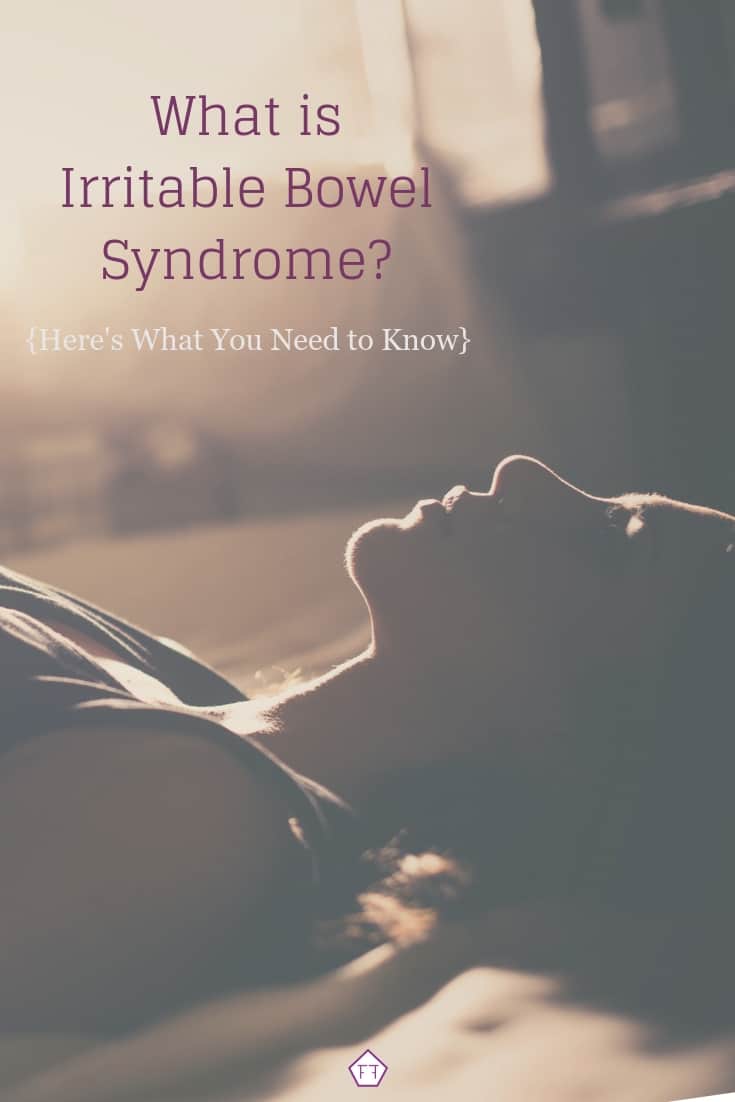If you’re suffering from chronic digestive issues like diarrhea or constipation, your internet travels may have led you to irritable bowel syndrome. So what is IBS? And, more importantly, do you have it? The answer to both questions is complicated.
In this article, we’ll talk about what you need to know about irritable bowel syndrome including common symptoms, diagnostic criteria, and ways IBS community members manage symptoms. Be forewarned, you’re about to get the scoop on poop!

What is IBS?
Irritable Bowel Syndrome is a chronic Functional Gastrointestinal Disorder (FGID) of the large intestine (colon). That is a lot of words, and not a lot of help, so let’s start from the beginning in plain English.
Irritable Bowel Syndrome is a chronic illness because a person’s symptoms linger over long periods of time. While the flu can last several days, IBS symptoms last months or years. In fact, people with IBS need a 3-month history of consistent symptoms before they can be diagnosed.
Currently, there is no cure for IBS. Don’t worry, though. We’ll discuss ways community members manage their daily symptoms in a minute.
Like other disorders under the FGID umbrella, IBS symptoms are caused by the way the smooth muscles in your gut behave. This means there won’t be any evidence of physical damage or chemical imbalances to explain your symptoms. Because of this, there currently isn’t a test to confirm irritable bowel syndrome.* As a result, your doctor will diagnose you based on your symptoms.
When Should I See a Doctor for my Symptoms?
Since there’s no official test, it may be tempting to diagnose yourself. This is a bad plan! Many serious illnesses begin with IBS-like symptoms, so it’s important to see your doctor. They can screen for warning signs of more sinister problems like celiac disease, chrons, ulcerative colitis, bowel cancer, etc. These illnesses damage your body and should be diagnosed as soon as possible.
It’s worth noting that even if your doctor thinks you have IBS, they may send you for additional testing. These tests rule out structural issues like inflammatory bowel disease, obstructions (like impacted poop), or tumors, and biochemical causes like acid or hormonal imbalances. Your doctor normally orders these tests “just in case” and a diagnosis does not require them.
But, because doctors often don’t tell patients they’re being overly cautious, irritable bowel syndrome has developed a reputation as a “diagnosis of exclusion.” This means people with IBS often feel they receive their diagnosis because their doctor ran out of tests; not because they meet the diagnostic criteria.
Because of this is often a deep sense of abandonment within the IBS community. So many of us feel like we’re stuck with a catch-all diagnosis and left with limited resources for treating problematic bowel habits and symptoms. However, despite this feeling, IBS is a legitimate and recognized disorder and it has a specific list of diagnostic criteria.

Common IBS Symptoms
One of the most frustrating things about irritable bowel syndrome is that it affects everyone differently. What triggers me may not bother you, and what affects both of us may be fine for someone else. The same holds true for how we react to triggers.
Though there are many symptoms associated with irritable bowel syndrome, the cornerstone of IBS is abdominal pain. This pain can appear anywhere in your abdominal cavity (from the bottom of your ribs to your hips). Bowel movements may relieve the pain, or the pain may be constant.
More common symptoms include abdominal bloating and distention, cramping, gas, diarrhea or constipation, a feeling of incomplete evacuation, or urgency. Both the severity and combination of symptoms are unique to each person.
One of the great mysteries of IBS is that asparagus may give me cramps and you diarrhea while Bob can enjoy it by the bunch.
Secondary GI Symptoms
Many people with IBS experience digestive symptoms outside of their intestines. For example, 25-50% of IBS patients report symptoms like heartburn, feeling overly full, or feeling nauseated. If you experience symptoms like these, let your doctor know as 50% of people with IBS report a second FGIDs. So you need to know if these symptoms are caused by IBS or if there is a second issue on your hands. This will help you adjust your symptom management plan to suit your personal needs.
Secondary Non-GI Symptoms
To make things even more complicated, some IBS symptoms have nothing to do with your gut. The ROME IV lists fatigue, chronic pain, and poor sleep quality as recognized non-GI IBS symptoms. You might also experience generalized muscle pain, sexual dysfunction, or headaches.
Do I have IBS?
So, now that you know IBS is a long-term case of angry guts without a cause, do you have it? I can’t tell you one way or another, but we can talk about the specific criteria your doctor is looking for.
The ROME Foundation developed the diagnostic criteria for IBS in 1990. Doctors use this information checklist to decide whether or not you have IBS. If you don’t meet the criteria, other options include functional diarrhea (FD), functional constipation (FC), functional abdominal bloating/distension (FAB/D), and unspecified functional bowel disorder (U-FBD).
According to the ROME IV, a person must report abdominal pain at least once a week for 3 months or more to receive an IBS diagnosis. Along with a combination of two or more of the following criteria:
- Pain related to bowel movements;
- Change in the frequency of stool; and
- Change in the appearance of stool based on the Bristol Stool Scale – This symptom must be present for 6 months or more to fulfill the criteria.
If you feel you meet this criterion, you may have irritable bowel syndrome. However, a diagnosis should always be provided by a medical professional.
Understanding IBS Sub-categories
If you’ve joined an IBS community, you may have noticed members identify themselves as IBS-C, -D or -M/A. If you feel like you’re missing something, don’t fret.
IBS patients subdivide into one of 4 groups once diagnosed: IBS-C, IBS-D, IBS-M (A), or IBS-U. Each subcategory has another specific set of criteria. These are based on the number of irregular bowel movements that fall within a specific range on the Bristol Stool Scale.
What this means is, when you add up your problematic bowel movements at the end of the month, how many of them were constipation or diarrhea according to the Bristol Stool Scale.
The technical breakdown for each subcategory:
IBS-C: People in this group suffer mostly from constipation. To be assigned to this group, at least 1/4 (25%) of a person’s bowel movements must fall clearly between 1 and 2 on the Bristol Scale.
IBS-D: People in this group mostly suffer from diarrhea. To be assigned to this group, at least 1/4 (25%) of a person’s bowel movements must fall clearly between 6 and 7 on the Bristol Scale.
IBS-M: People in this category experience both constipation and diarrhea. They are described as “mixed” (M). However, within the IBS community, they are often called “alternating” (A). Either one is generally acceptable.
People assigned to this group require at least 1/4 (25%) of their bowel movements to fall between 1 and 2 (C) and an additional 1/4 (25%) or more to fall between 6 and 7 (D) on the Bristol Stool Scale.
IBS-U: People who don’t fit clearly into the IBS-C, -D, or -M categories are considered “unspecified.” This is where most people fall. If your doctor didn’t give you a category when you were diagnosed, you likely fit in here.
It’s worth noting that these subcategories aren’t based on how severe your symptoms are. Instead, they’re based on the percentage of problematic bowel movements that fit within a specific range on the Bristol Stool Scale.
Being in the unspecified group doesn’t mean your symptoms are better or worse than anyone else’s. Only that your bowel movements don’t meet the criteria for the -C, -D, or M/A subcategories.

Managing Daily IBS Symptoms
Because there is no known cure for irritable bowel syndrome, you need to find ways to manage your daily symptoms. One of the best ways to do this is to find the things that trigger your digestive tract in the first place.
Stress is a common trigger for some people’s symptoms. People who deal with chronic stress may benefit from stress management like meditation, physical activity, and setting healthy boundaries.
If you find your gut is sensitive to stress, you can also try personal therapy and behavioural modification techniques like cognitive behaviour therapy (CBT) or dialectical behaviour therapy (DBT), etc. Monash University is also exploring gut-directed hypnotherapy as an effective long-term symptom management tool.
Other people find certain foods are triggers for their symptoms. People in this group may benefit from investigating specific trigger foods in their daily meals.
These include general gut irritants like fat, caffeine, alcohol, or sugar. If testing common gut irritants doesn’t relax your bowel habits, try more focused programs like the Low FODMAP Diet to track down common food triggers.
Many people benefit from a combination of stress relief, lifestyle changes and diet changes. If those don’t provide enough relief, you can also ask your doctor about medications like antispasmodics and laxatives to help manage your symptoms.
If you’re diagnosed with IBS, the symptom management tools you need will be specific to you. Remember that while IBS support communities can be helpful, every person is different, so what is healthy and right for their bodies may not be healthy and right for you. Amd when someone insists there is one treatment method for IBS, just remember Bob and his asparagus.
Final Thoughts
If you came here to understand more about irritable bowel syndrome, this is what I hope you take away: IBS is a chronic disorder of the large intestine (colon). It has no signs to look for, no tests to confirm your diagnosis, and currently, no cure.
However, it does have a specific set of criteria and is a legitimate and recognized medical disorder. With this in mind, if you are experiencing frequent abdominal pain combined with problematic bowel habits it’s time to speak to your doctor.
Finally, I want you to take away hope that there are more avenues to explore, possibilities to consider and, most importantly, that you are not alone.
* There is currently a blood test for post-infectious IBS-D called IBScheck. I cannot confirm the accuracy of this test as there is not enough research to determine its reliability at this time.
You might also like one of these:
- What is a normal poop? Everybody does it! Let’s set the record straight about what you should see when you peek in the bowl.
- How long does it take the low FODMAP diet to work? Wondering how long it takes to see changes on the low FODMAP diet? Like most things about IBS, the answer is… complicated.
- Why do IBS symptoms flare on your period? Wondering why your IBS symptoms always seem worse on your period? Check out this article for everything you need to know about IBS and your period!
If you like this post, don’t forget to share it! Together we’ll get the low FODMAP diet down to a science!
Resources
This article was edited by Dr. Anne Agur B.Sc.O.T; M.Sc; Ph.D.
- Drossman, D. A., & Chang, L. (2016). Rome IV multidimensional clinical profile (MDCP) for functional gastrointestinal disorders. Raleigh: Rome Foundation.
- Dugum, M., MD, Barco, K., RD, LS, CNSC, & Garg, S., MD. (2016). Managing irritable bowel syndrome: The low-FODMAP diet. Cleveland Clinic Journal of Medicine, 83(9), 655-662. Retrieved from hhttp://www.mdedge.com/ccjm/article/111918/gastroenterology/managing-irritable-bowel-syndrome-low-fodmap-diet
- Heidelbaugh, J., & Hungin, P. (2016). Rome IV Functional Gastrointestinal Disorders for Primary Care and Non-Gi Clinicians (First ed.). Raleigh, NC: Rome Foundation.
- Mayo Clinic Staff. (2014, July 31). Irritable Bowel Syndrome (IBS) Fact Sheet. Retrieved April 22, 2017, from http://www.mayoclinic.org/diseases-conditions/irritable-bowel-syndrome/basics/definition/con-20024578
- The Monash University low FODMAP diet: reducing poorly absorbed sugars to control gastrointestinal symptoms. (2013). Clayton, Vic.: Monash University.
- Womens Health.Org (2012, July 16). Irritable Bowel Syndrome (IBS) Fact Sheet. Retrieved April 22, 2017, from https://www.womenshealth.gov/publications/our-publications/fact-sheet/irritable-bowel-syndrome.html#a

